
An orchestra is a large instrumental ensemble typical of classical music, which combines instruments from different families. There are typically four main sections of instruments:

Philip Glass is an American composer and pianist. He is widely regarded as one of the most influential composers of the late 20th century. Glass's work has been associated with minimalism, being built up from repetitive phrases and shifting layers. Glass describes himself as a composer of "music with repetitive structures", which he has helped to evolve stylistically.
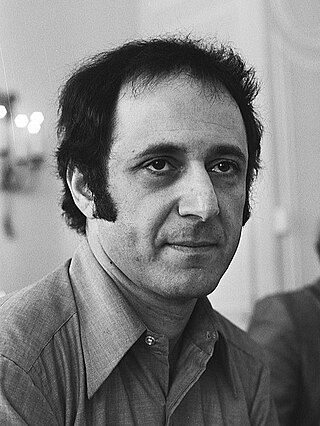
Stephen Michael Reich is an American composer best known as a pioneer of minimal music in the mid to late 1960s. Reich's work is marked by its use of repetitive figures, slow harmonic rhythm, and canons. Reich describes this concept in his essay, "Music as a Gradual Process", by stating, "I am interested in perceptible processes. I want to be able to hear the process happening throughout the sounding music." For example, his early works experiment with phase shifting, in which one or more repeated phrases plays slower or faster than the others, causing it to go "out of phase." This creates new musical patterns in a perceptible flow.

In C is a musical piece composed by Terry Riley in 1964. It consists of series of 53 short melodic fragments that can be repeated at the discretion of the musicians. It is often cited as the first minimalist composition to make a significant impact on the public consciousness and inspire a new movement. The number of performers is unspecified. Riley suggests "a group of about 35 is desired if possible but smaller or larger groups will work".

Richard Gavin Bryars is an English composer and double bassist. He has worked in jazz, free improvisation, minimalism, historicism, avant-garde, and experimental music.
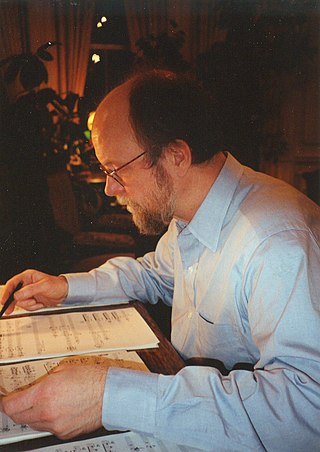
Charles Peter Wuorinen was an American composer of contemporary classical music based in New York City. He also performed as a pianist and conductor. Wuorinen composed more than 270 works: orchestral music, chamber music, solo instrumental and vocal works, and operas, such as Brokeback Mountain. His work was termed serialist but he came to disparage that idea as meaningless. Time's Encomium, his only purely electronic piece, received the Pulitzer Prize. Wuorinen taught at several institutions, including Columbia University, Rutgers University and the Manhattan School of Music.
Music for 18 Musicians is a work of minimalist music composed by Steve Reich during 1974–1976. Its world premiere was on April 24, 1976, at The Town Hall in the Midtown Manhattan Theater District. Following this, a recording of the piece was released on the ECM New Series in 1978. The 1998 recording for Nonesuch Records won the Grammy Award for Best Small Ensemble Performance.

Dave Douglas is an American jazz trumpeter, composer, and educator. His career includes more than fifty recordings as a leader and more than 500 published compositions. His ensembles include the Dave Douglas Quintet; Sound Prints, a quintet co-led with saxophonist Joe Lovano; Uplift, a sextet with bassist Bill Laswell; Present Joys with pianist Uri Caine and Andrew Cyrille; High Risk, an electronic ensemble with Shigeto, Jonathan Aaron, and Ian Chang; and Engage, a sextet with Jeff Parker, Tomeka Reid, Anna Webber, Nick Dunston, and Kate Gentile.
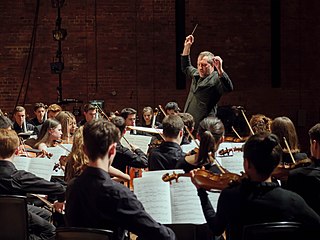
Thomas Joseph Edmund Adès is a British composer, pianist and conductor. Five compositions by Adès received votes in the 2017 Classic Voice poll of the greatest works of art music since 2000: The Tempest (2004), Violin Concerto (2005), Tevot (2007), In Seven Days (2008), and Polaris (2010).
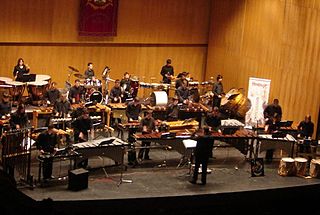
A percussion ensemble is a musical ensemble consisting of only percussion instruments. Although the term can be used to describe any such group, it commonly refers to groups of classically trained percussionists performing primarily classical music. In America, percussion ensembles are most commonly found at conservatories, though some professional groups, such as Nexus and So Percussion exist. Drumlines and groups who regularly meet for drum circles are two other forms of the percussion ensemble.

Budapest has long been an important part of the music of Hungary. Its music history has included the composers Franz Liszt, Ernő Dohnányi, Zoltán Kodály and Béla Bartók and the opera composer Ferenc Erkel.

Péter Eötvös was a Hungarian composer, conductor and academic teacher.

Alarm Will Sound is a 20-member chamber orchestra that focuses on recordings and performances of contemporary classical music. Its performances have been described as "equal parts exuberance, nonchalance, and virtuosity" by the Financial Times and as "a triumph of ensemble playing" by the San Francisco Chronicle. The New York Times said that Alarm Will Sound is "one of the most vital and original ensembles on the American music scene."
Vox Novus is a New York City-based organization consisting of composers, musicians, and music enthusiasts which presents and supports new music. Vox Novus was founded by Robert Voisey to promote contemporary composers in 2000.

Timothy Wesley John Brady is a Canadian composer, electric guitarist, improvising musician, concert producer, record producer and cultural activist. Working in the field of contemporary classical music, experimental music, and musique actuelle, his compositions utilize a variety of styles from serialism to minimalism and often incorporate modern instruments such as electric guitars and other electroacoustic instruments. His music is marked by a synthesis of musical languages, having developed an ability to use elements of many musical styles while retaining a strong sense of personal expression. Some of his early recognized works are the 1982 orchestral pieces Variants and Visions, his Chamber Concerto (1985), the chamber trio ...in the Wake..., and his song cycle Revolutionary Songs (1994).

Brilliant Classics is a classical music label based in the Dutch town of Leeuwarden. It is renowned for releasing super-budget-priced editions on CD of the complete works of J.S. Bach, Mozart, Beethoven and many other composers. The label also specialises in new recordings of early music, chamber, organ and piano music.
Sam Hayden is an English composer of classical and electronic music and an academic. His music has won several prestigious prizes and been performed widely at international music festivals.

The UCLA Herb Alpert School of Music, located on the campus of the University of California, Los Angeles, is “the first school of music to be established in the University of California system.” Established in 2007 under the purview of the UCLA School of Arts and Architecture and the UCLA Division of Humanities, the UC Board of Regents formally voted in January 2016 to establish the school. It is supported in part by a $30 million endowment from the Herb Alpert Foundation.
The Colin Currie Group is a British percussion group founded and led by Colin Currie. This ensemble is dedicated to performing and recording the music of Steve Reich.
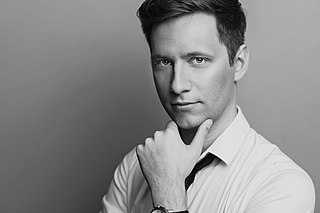
Máté Bella is a Junior Prima Award, Erkel Ferenc and Béla Bartók–Ditta Pásztory Prize winner composer and university lecturer.















